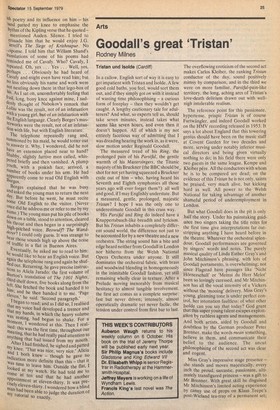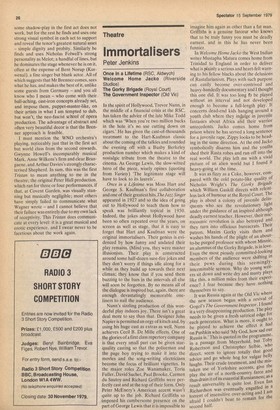Arts
Goodall's great 'Tristan'
Rodney Milnes
Tristan und Isolde (Cardiff) In a callow, English sort of way it is easy to get impatient with Tristan and Isolde. A few good cold baths, you feel, would sort them out, and if they simply got on with it instead of wasting time philosophising — a curious form of foreplay — then they wouldn't get caught. A lengthy cautionary tale for adulterers? And what, so experts tell us, should take seven minutes, instead takes what seems like seven hours, and even then it doesn't happen. All of which is my not entirely facetious way of admitting that I was dreading hearing the work in, as it were. slow motion under Reginald Goodall.
The measured tread of his Ring, the prolonged pain of his Parsifal, the gentle warmth of his Mastersingers, the Titanic majesty of his Bruckner (the BBC should be,„ shot for not yet having squeezed a Bruckner cycle out of him — who, having heard his Seventh and Eighth symphonies all those years ago will ever forget them?): all well and good, if I may Englishly understate. But a measured, gentle. prolonged, majestic Tristan? I hope I was the only one to underestimate Goodall in this crass way.
His Parsifal and Ring do indeed have a Knappertsbusch-like breadth and lyricism. But his Tristan inhabits a completely different sound world, the difference not just to be accounted for by a new theatre and a new orchestra. The string sound has a bite and edge heard neither from Goodall in London nor hitherto from the Welsh National Opera Orchestra under anyone. It still dominates the orchestral fabric, with brass and woodwind blending in homogeneously in the inimitable Goodall fashion, yet still remaining wholly clear in texture. After a Prelude moving inexorably from musical hesitancy to almost tangible involvement, the first act comes as a complete surprise: fast but never driven; intensely, almost operatically dramatic yet never facile, the tension under control from first bar to last. The overflowing eroticism of the second act makes Carlos Kleiber, the ranking Tristan conductor of the day, sound positively mimsy by comparison, and in the third we were on more familiar, Parsifal-pain-like territory, the long, aching arcs of Tristan's love-death delirium drawn out with wellnigh intolerable realism.
The reference point for this passionate, hypertense, priapic Tristan is of course Furtwangler, and indeed Goodall worked on the HMV recording released in 1953. It says a lot about England that this towering genius should have been on the music staff at Covent Garden for two decades and more, serving under notably inferior musical directors and being given virtually nothing to do; in his field there were only two guests in the same league, Kempe and Kleiber Ore. All the conductors with whom he is to be compared are dead; on the evidence of this Tristan he is not only, saints be praised, very much alive, but kicking hard as well. All power to the Welsh National for taking advantage of another shameful period of underemployment in London.
But what Goodall does in the pit is only half the story. Under his painstaking guidance two singers taking the title roles for the first time give interpretations far outstripping anything I have heard before in the theatre. Whatever the orchestral splendour, Goodall performances are governed by singers' words and notes. The purely musical quality of Linda Esther Gray's and John Mitchinson's phrasing, with lots of Goodall portamento, is overwhelming; not since Flagstad have passages like 'Nicht Hornerschall' or `Meinst du Herr Melot' been so lovingly caressed, and Mr Mitchinson has all the vocal intensity of a Vickers without the 'mooing' delivery. Miss Gray's young, gleaming tone is under perfect control, her intonation faultless: of what other Isolde can you say that today? God grant that this super young talent escapes exploit,ation by ruthless atents and managements. And both artists, aided by Goodall and doubtless by the German producer Peter Brenner, make the words mean something, believe in them, and communicate their belief to the audience. The uncut philosophising of the second act was clear and cogent.
Miss Gray's impressive stage presence — she stands and moves majestically, every inch the proud, sarcastic, passionate, ultimately transfigured princess — was a gift to Mr Brenner, With great skill he disguised Mr Mitchinson's limited acting experience by canny use of props on Klaus Teepe's post-Wieland tea-tray of a permanent set; some shadow-play in the first act does not work, but for the rest he finds and uses one strong visual symbol in each act to support and reveal the tenor's greatest natural asset — simple dignity and probity. Similarly he finds and uses Nicholas Folwell's strong personality as Melot; a handful of lines, but he dominates the stage whenever he is on it, often at the expense of Bent Norup (Kurwenal), a fine singer but blank actor. All of which suggests that Mr Brenner comes, sees what he has, and makes the best of it, unlike some guests from Germany — and you all know who I mean — who come with their ball-aching, cast-iron concepts already set, and impose them, puppet-master-like, on their artists in what I am tempted to dub, but won't, the neo-fascist school of opera production. The advantage of abstract and often very beautiful decor is that the Brenner approach is feasible.
I must mention the WNO orchestra's playing, noticeably just that in the first act but world class from the second onwards, Gwynne Howell's incomparably musical Mark, Anne Wilkens's firm and clear Brangaene, and Arthur Davies's strongly characterised Shepherd. In sum, this was the first Tristan to mean anything to me in the theatre; the original Peter Hall production, which ran for three or four performances, if that, at Covent Garden, was visually stunning but musically negligible; most others have simply failed to communicate what Wagner wrote — and I cannot believe that their failure was entirely due to my own lack of receptivity. This Tristan does communicate at every level: it is a great musical and erotic experience, and I swear never to be facetious about the work again,



































 Previous page
Previous page